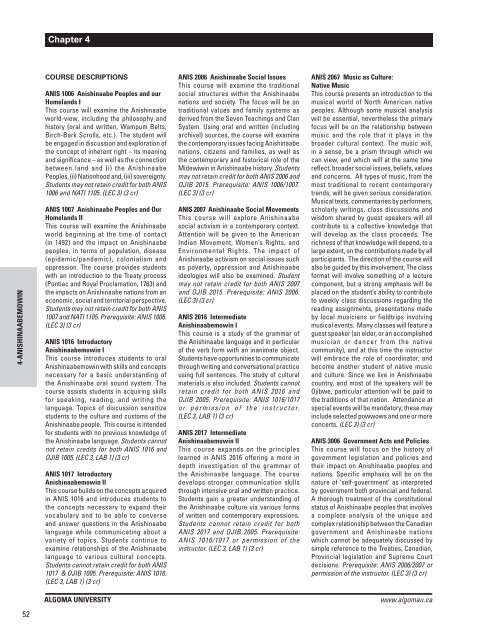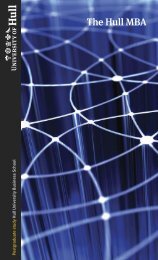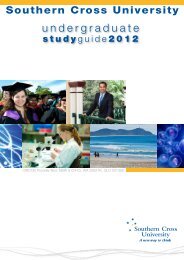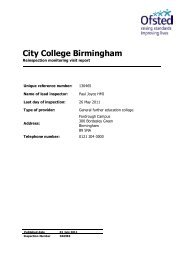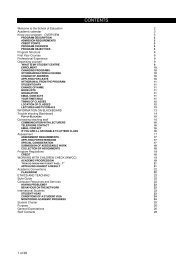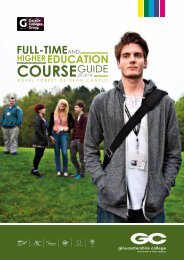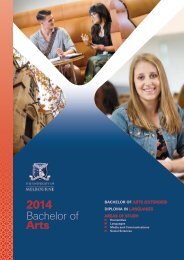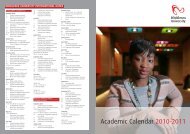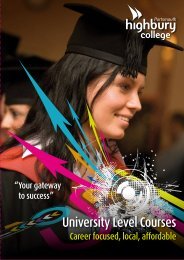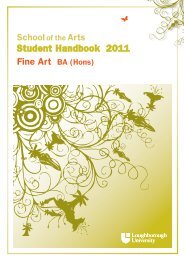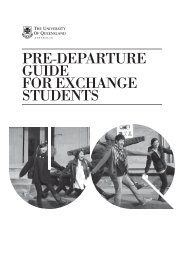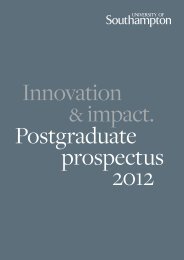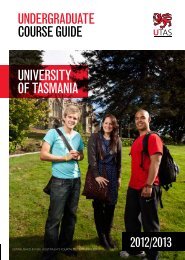You also want an ePaper? Increase the reach of your titles
YUMPU automatically turns print PDFs into web optimized ePapers that Google loves.
Chapter 4<br />
4-ANISHINAABEMOWIN<br />
COURSE DESCRIPTIONS<br />
ANIS 1006 Anishinaabe Peoples and our<br />
Homelands I<br />
This course will examine the Anishinaabe<br />
world-view, including the philosophy and<br />
history (oral and written, Wampum Belts,<br />
Birch-Bark Scrolls, etc.). The student will<br />
be engaged in discussion and exploration of<br />
the concept of inherent right – its meaning<br />
and significance – as well as the connection<br />
between land and (i) the Anishinaabe<br />
Peoples, (ii) Nationhood and, (iii) sovereignty.<br />
Students may not retain credit for both ANIS<br />
1006 and NATI 1105. (LEC 3) (3 cr)<br />
ANIS 1007 Anishinaabe Peoples and Our<br />
Homelands II<br />
This course will examine the Anishinaabe<br />
world beginning at the time of contact<br />
(in 1492) and the impact on Anishinaabe<br />
peoples, in terms of population, disease<br />
(epidemic/pandemic), colonialism and<br />
oppression. The course provides students<br />
with an introduction to the Treaty process<br />
(Pontiac and Royal Proclamation, 1763) and<br />
the impacts on Anishinaabe nations from an<br />
economic, social and territorial perspective.<br />
Students may not retain credit for both ANIS<br />
1007 and NATI 1105. Prerequisite: ANIS 1006.<br />
(LEC 3) (3 cr)<br />
ANIS 1016 Introductory<br />
Anishinaabemowin I<br />
This course introduces students to oral<br />
Anishinaabemowin with skills and concepts<br />
necessary for a basic understanding of<br />
the Anishinaabe oral sound system. The<br />
course assists students in acquiring skills<br />
for speaking, reading, and writing the<br />
language. Topics of discussion sensitize<br />
students to the culture and customs of the<br />
Anishinaabe people. This course is intended<br />
for students with no previous knowledge of<br />
the Anishinaabe language. Students cannot<br />
not retain credits for both ANIS 1016 and<br />
OJIB 1005. (LEC 3, LAB 1) (3 cr)<br />
ANIS 1017 Introductory<br />
Anishinaabemowin II<br />
This course builds on the concepts acquired<br />
in ANIS 1016 and introduces students to<br />
the concepts necessary to expand their<br />
vocabulary and to be able to converse<br />
and answer questions in the Anishinaabe<br />
language while communicating about a<br />
variety of topics. Students continue to<br />
examine relationships of the Anishinaabe<br />
language to various cultural concepts.<br />
Students cannot retain credit for both ANIS<br />
1017 & OJIB 1005. Prerequisite: ANIS 1016.<br />
(LEC 3, LAB 1) (3 cr)<br />
ANIS 2006 Anishinaabe Social Issues<br />
This course will examine the traditional<br />
social structures within the Anishinaabe<br />
nations and society. The focus will be on<br />
traditional values and family systems as<br />
derived from the Seven Teachings and Clan<br />
System. Using oral and written (including<br />
archival) sources, the course will examine<br />
the contemporary issues facing Anishinaabe<br />
nations, citizens and families, as well as<br />
the contemporary and historical role of the<br />
Midewiwin in Anishinaabe history. Students<br />
may not retain credit for both ANIS 2006 and<br />
OJIB 2015. Prerequisite: ANIS 1006/1007.<br />
(LEC 3) (3 cr)<br />
ANIS 2007 Anishinaabe Social Movements<br />
This course will explore Anishinaabe<br />
social activism in a contemporary context.<br />
Attention will be given to the American<br />
Indian Movement, Women’s Rights, and<br />
Environmental Rights. The impact of<br />
Anishinaabe activism on social issues such<br />
as poverty, oppression and Anishinaabe<br />
ideologies will also be examined. Student<br />
may not retain credit for both ANIS 2007<br />
and OJIB 2015. Prerequisite: ANIS 2006.<br />
(LEC 3) (3 cr)<br />
ANIS 2016 Intermediate<br />
Anishinaabemowin I<br />
This course is a study of the grammar of<br />
the Anishinaabe language and in particular<br />
of the verb form with an inanimate object.<br />
Students have opportunities to communicate<br />
through writing and conversational practice<br />
using full sentences. The study of cultural<br />
materials is also included. Students cannot<br />
retain credit for both ANIS 2016 and<br />
OJIB 2005. Prerequisite: ANIS 1016/1017<br />
or permission of the instructor.<br />
(LEC 3, LAB 1) (3 cr)<br />
ANIS 2017 Intermediate<br />
Anishinaabemowin II<br />
This course expands on the principles<br />
learned in ANIS 2016 offering a more in<br />
depth investigation of the grammar of<br />
the Anishinaabe language. The course<br />
develops stronger communication skills<br />
through intensive oral and written practice.<br />
Students gain a greater understanding of<br />
the Anishinaabe culture via various forms<br />
of written and contemporary expressions.<br />
Students cannot retain credit for both<br />
ANIS 2017 and OJIB 2005. Prerequisite:<br />
ANIS 1016/1017 or permission of the<br />
instructor. (LEC 3, LAB 1) (3 cr)<br />
ANIS 2067 Music as Culture:<br />
Native Music<br />
This course presents an introduction to the<br />
musical world of North American native<br />
peoples. Although some musical analysis<br />
will be essential, nevertheless the primary<br />
focus will be on the relationship between<br />
music and the role that it plays in the<br />
broader cultural context. The music will,<br />
in a sense, be a prism through which we<br />
can view, and which will at the same time<br />
reflect, broader social issues, beliefs, values<br />
and concerns. All types of music, from the<br />
most traditional to recent contemporary<br />
trends, will be given serious consideration.<br />
Musical texts, commentaries by performers,<br />
scholarly writings, class discussions and<br />
wisdom shared by guest speakers will all<br />
contribute to a collective knowledge that<br />
will develop as the class proceeds. The<br />
richness of that knowledge will depend, to a<br />
large extent, on the contributions made by all<br />
participants. The direction of the course will<br />
also be guided by this involvement. The class<br />
format will involve something of a lecture<br />
component, but a strong emphasis will be<br />
placed on the student’s ability to contribute<br />
to weekly class discussions regarding the<br />
reading assignments, presentations made<br />
by local musicians or fieldtrips involving<br />
musical events. Many classes will feature a<br />
guest speaker (an elder, or an accomplished<br />
musician or dancer from the native<br />
community), and at this time the instructor<br />
will embrace the role of coordinator, and<br />
become another student of native music<br />
and culture. Since we live in Anishinaabe<br />
country, and most of the speakers will be<br />
Ojibwe, particular attention will be paid to<br />
the traditions of that nation. Attendance at<br />
special events will be mandatory; these may<br />
include selected powwows and one or more<br />
concerts. (LEC 3) (3 cr)<br />
ANIS 3006 Government Acts and Policies<br />
This course will focus on the history of<br />
government legislation and policies and<br />
their impact on Anishinaabe peoples and<br />
nations. Specific emphasis will be on the<br />
nature of ‘self-government’ as interpreted<br />
by government both provincial and federal.<br />
A thorough treatment of the constitutional<br />
status of Anishinaabe peoples that involves<br />
a complete analysis of the unique and<br />
complex relationship between the Canadian<br />
government and Anishinaabe nations<br />
which cannot be adequately discussed by<br />
simple reference to the Treaties, Canadian,<br />
Provincial legislation and Supreme Court<br />
decisions. Prerequisite: ANIS 2006/2007 or<br />
permission of the instructor. (LEC 3) (3 cr)<br />
ALGOMA UNIVERSITY<br />
www.algomau.ca<br />
52


